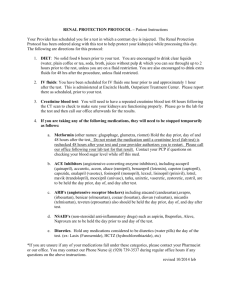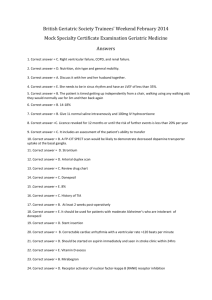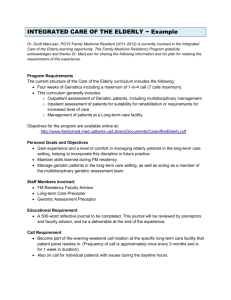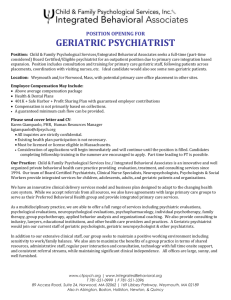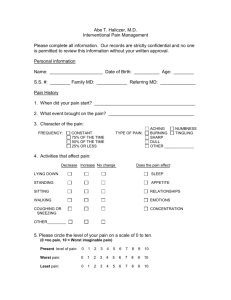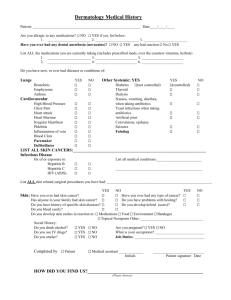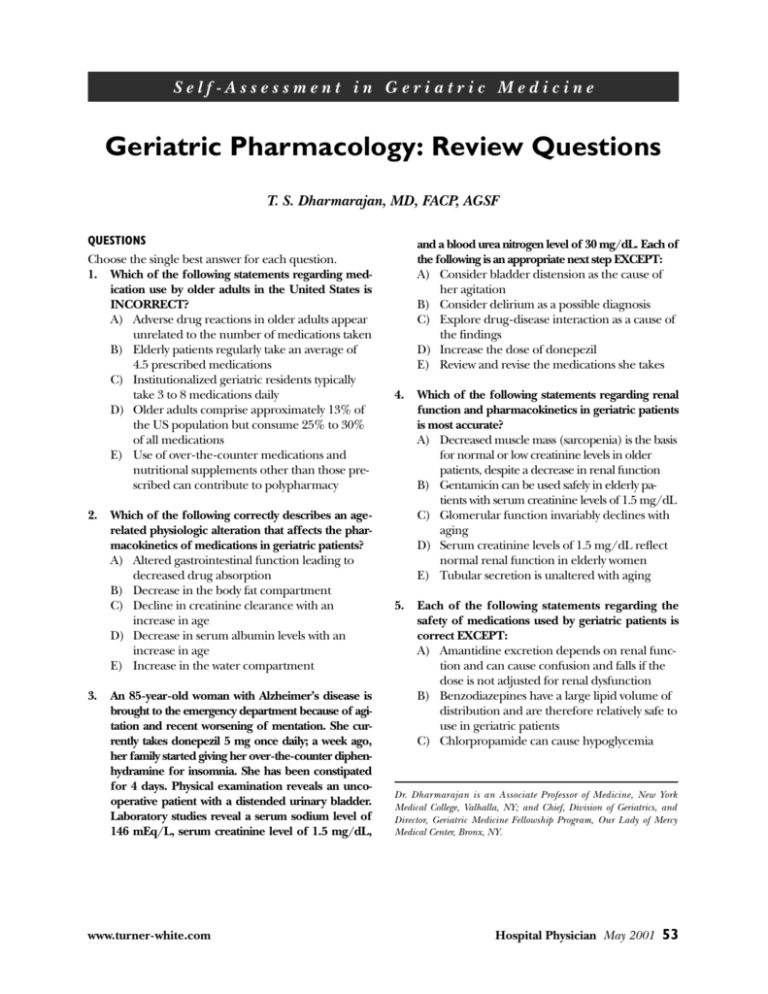
Self -Assessment in Geriatric Medicine
Geriatric Pharmacology: Review Questions
T. S. Dharmarajan, MD, FACP, AGSF
QUESTIONS
Choose the single best answer for each question.
1. Which of the following statements regarding medication use by older adults in the United States is
INCORRECT?
A) Adverse drug reactions in older adults appear
unrelated to the number of medications taken
B) Elderly patients regularly take an average of
4.5 prescribed medications
C) Institutionalized geriatric residents typically
take 3 to 8 medications daily
D) Older adults comprise approximately 13% of
the US population but consume 25% to 30%
of all medications
E) Use of over-the-counter medications and
nutritional supplements other than those prescribed can contribute to polypharmacy
2.
3.
Which of the following correctly describes an agerelated physiologic alteration that affects the pharmacokinetics of medications in geriatric patients?
A) Altered gastrointestinal function leading to
decreased drug absorption
B) Decrease in the body fat compartment
C) Decline in creatinine clearance with an
increase in age
D) Decrease in serum albumin levels with an
increase in age
E) Increase in the water compartment
An 85-year-old woman with Alzheimer’s disease is
brought to the emergency department because of agitation and recent worsening of mentation. She currently takes donepezil 5 mg once daily; a week ago,
her family started giving her over-the-counter diphenhydramine for insomnia. She has been constipated
for 4 days. Physical examination reveals an uncooperative patient with a distended urinary bladder.
Laboratory studies reveal a serum sodium level of
146 mEq/L, serum creatinine level of 1.5 mg/dL,
www.turner-white.com
and a blood urea nitrogen level of 30 mg/dL. Each of
the following is an appropriate next step EXCEPT:
A) Consider bladder distension as the cause of
her agitation
B) Consider delirium as a possible diagnosis
C) Explore drug-disease interaction as a cause of
the findings
D) Increase the dose of donepezil
E) Review and revise the medications she takes
4.
Which of the following statements regarding renal
function and pharmacokinetics in geriatric patients
is most accurate?
A) Decreased muscle mass (sarcopenia) is the basis
for normal or low creatinine levels in older
patients, despite a decrease in renal function
B) Gentamicin can be used safely in elderly patients with serum creatinine levels of 1.5 mg/dL
C) Glomerular function invariably declines with
aging
D) Serum creatinine levels of 1.5 mg/dL reflect
normal renal function in elderly women
E) Tubular secretion is unaltered with aging
5.
Each of the following statements regarding the
safety of medications used by geriatric patients is
correct EXCEPT:
A) Amantidine excretion depends on renal function and can cause confusion and falls if the
dose is not adjusted for renal dysfunction
B) Benzodiazepines have a large lipid volume of
distribution and are therefore relatively safe to
use in geriatric patients
C) Chlorpropamide can cause hypoglycemia
Dr. Dharmarajan is an Associate Professor of Medicine, New York
Medical College, Valhalla, NY; and Chief, Division of Geriatrics, and
Director, Geriatric Medicine Fellowship Program, Our Lady of Mercy
Medical Center, Bronx, NY.
Hospital Physician May 2001
53
Self -Assessment in Geriatric Medicine : pp. 53 – 54
from prolonged action and is not safe to use
in elderly patients
D) Meperidine and its metabolite normeperidine
can potentially cause seizures in older patients
and so should be used sparingly in the elderly
E) Metronidazole generally can be safely administered to older patients without dose alteration
EXPLANATION OF ANSWERS
1. (A) Adverse drug reactions in older adults appear
unrelated to the number of medications taken.
Geriatric patients consume a disproportionate number of medications, compared with the rest of the
US population. Polypharmacy, the use of multiple
prescribed and over-the-counter medications and
nutritional supplements, is a cause of adverse drug
reactions. The chronic use of 2 medications simultaneously is associated with a 15% risk for adverse
drug reaction, but the use of 5 drugs results in a risk
of over 50%. Rather than age, the number of medications taken appears related to adverse effects in
older adults. Institutionalized geriatric residents
take a large number of medications, with cardiovascular, analgesic, and central nervous system agents
being the most frequently prescribed.
2. (C) Decline in creatinine clearance with an increase in
age. Several changes that occur with age affect pharmacokinetics and pharmacodynamics in elderly
patients. A decrease in creatinine clearance (although
not invariable) occurs commonly with increasing age
at the rate of 7.5 to 10 mL/min per decade of life and
necessitates adjustment in the dosage of renally
excreted drugs. Aging is associated with an increase in
the body fat compartment, resulting in a larger volume of distribution for lipid-soluble drugs; at the
same time, the water compartment decreases, resulting in an increased concentration of water-soluble
drugs. Gastrointestinal changes are not significant and
do not alter drug absorption with normal aging.
Albumin levels do not change appreciably with age
alone; any decrease usually results from disease.
3. (D) Increase the dose of donepezil. The patient has
Alzheimer’s disease, characterized by a decrease in
cholinergic activity in the brain. Addition of diphenhydramine, a drug with anticholinergic properties,
was likely responsible for her worsening mentation
and agitation (ie, drug-induced delirium and drugdisease interaction). Her urinary retention and constipation were also drug-induced, although fecal
impaction is a possible cause of the distended bladder. An increase in the dose of donepezil will not
help her worsened mental state and agitation. Rather,
a review of the drugs she is taking and discontinuing
any offending agents (in this case, diphenhydramine) is the best approach in her care.
4. (A) Decreased muscle mass (sarcopenia) is the basis
for normal or low creatinine levels in older patients,
despite a decrease in renal function. Creatinine is a
derivative of muscle; sarcopenia (low muscle mass) is
the basis for low serum creatinine levels in elderly
patients, despite a decrease in renal function. A creatinine level of 1.5 mg/dL denotes a creatinine clearance of less than 50 mL/min in an older woman,
which is abnormally low. Aging is generally associated
with a decrease in the glomerular filtration rate (creatinine clearance) at the rate of 1 mL/min per year of
life, although this decrease is not invariable. Tubular
function also decreases with aging. Gentamicin, an
aminoglycoside, should be administered in lower
dosages in geriatric patients than in younger patients,
because a lower creatinine clearance and a smaller
amount of water in the body lead to a higher drug
concentration and the risk of toxicity.
5. (B) Benzodiazepines have a large lipid volume of
distribution and are therefore relatively safe to use
in geriatric patients. Although the stores of lipid
tend to become relatively larger with age, benzodiazepines accumulate in fat tissues and do not leave
the body, resulting in cumulative effects. Chronic
use of benzodiazepines in older patients is not safe
and is associated with cognitive changes, daytime
drowsiness, and increased body sway with falls.
Chlorpropamide is best avoided, and meperidine
and amantidine should be used with caution and
require dose reduction. Use of metronidazole is
generally safe in geriatric patients.
SUGGESTED READINGS
Dharmarajan TS, Tota R. Appropriate prescribing of medications in older adults. Fam Pract Recert 2000;22:29–38.
Leipzig RM. Pharmacology and appropriate prescribing. In:
Cobbs EL, Duthie EH, Murphy JB, editors. Geriatrics review
syllabus, 4th ed. Dubuque (IA): Kendall/Hunt Publishing Co;
1999:30–5.
Schwartz JB. Clinical pharmacology. In: Hazzard WR, Blass JP,
Ettinger WH, et al, editors. Principles of geriatric medicine
and gerontology. 4th ed. New York: McGraw-Hill, Health
Professions Division; 1999:303–31.
Copyright 2001 by Turner White Communications Inc., Wayne, PA. All rights reserved.
54 Hospital Physician May 2001
www.turner-white.com

